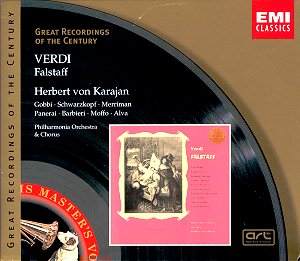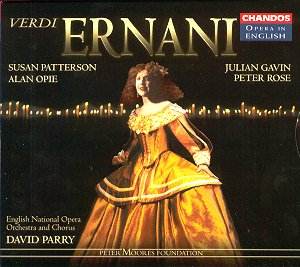 Giuseppe Verdi: Falstaff
Giuseppe Verdi: Falstaff
Philharmonia Orchestra & Chorus
Herbert von Karajan, conductor
Recorded 1956
EMI CLASSICS CMS5 67083 2 (2 CDs) [119.42]
Released: October 2001
Tito Gobbi, Luigi Alva, Rolando Panerai, Tomaso Spataro, Renato Ercolani, Nicola Zaccaria, Elizabeth Schwarzkopf, Anna Moffo, Nan Merriman, Fedora Barbieri
In the verdant landscape of Verdi’s operatic oeuvre, Falstaff stands as a testament to the composer’s late-career mastery—a lighthearted swan song that plays with the complexities of human folly and the folly of human complexity itself. The 1956 recording conducted by Herbert von Karajan offers a benchmark interpretation, showcasing a magnificent cast and a finely tuned orchestra that captures the essence of Verdi’s final operatic triumph.
From the outset, Karajan’s work is striking in its attention to detail. His interpretation is colored with a glossy sheen that embodies the sophisticated charm of the Philharmonia Orchestra. The recording benefits from the orchestra’s peak condition, particularly the brass section, which blazes with a brilliance that complements the vocal lines beautifully. This vitality is most evident in the exuberant orchestral postlude at the conclusion of Act 1, which serves as a fitting introduction to Falstaff’s world—a world teeming with comic misadventure and human warmth.
Tito Gobbi’s portrayal of Sir John Falstaff is nothing short of revelatory. His depiction is both multifaceted and deeply human; he infuses the character with a kaleidoscope of vocal color and emotional nuance. Gobbi’s opening monologue in Act 3, often cited as the crux of Falstaff’s character, is rendered with a gravitas that belies the jovial exterior of the character. However, it is the earlier moments, such as his lecture on honor in Act 1, that showcase his ability to oscillate between farce and poignancy, setting in motion a charismatic portrayal that remains engaging throughout.
The ensemble work in this recording is particularly noteworthy. The clarity of diction among the cast, especially the female voices, elevates the text, making the intricate wordplay of Verdi and his librettist, Arrigo Boito, resonate with clarity. The Garden Scene (Act 1, Scene 2) stands out as a highlight, where the women’s impeccable staccato singing punctuates the lively exchanges, while the lovers, Alva and Moffo, float above the ensemble with a mellifluous grace that is captivating. Their lyrical duets, buoyed by Dennis Brain’s haunting horn solo in Act 4, evoke a sense of romantic idealism that is simply exquisite.
Karajan’s interpretation, while polished, occasionally sacrifices some of the rawness that Toscanini’s performances are known for. The latter’s readings are often characterized by a more direct engagement with the opera’s earthy humor. In contrast, Karajan’s approach is more restrained, presenting a controlled laughter that, while elegant, can feel slightly distant from the boisterous spirit of the piece. This distinction is not to undermine Karajan’s vision, but rather to highlight how different interpretations can illuminate various facets of the same work.
The recording quality itself is commendable, particularly considering its vintage. The engineering captures the nuances of both the orchestra and the voices with a clarity that allows the listener to appreciate the intricate interplay between them. There is a warmth to the sound that draws one into the performance, making it a delight for both the discerning listener and the casual aficionado.
Historically, this recording is significant not only for its stellar cast but also for its place within the broader context of Verdi’s centenary celebrations. As other renditions, such as those by John Eliot Gardiner and Claudio Abbado, have emerged in recent years, they serve to enrich the ongoing dialogue surrounding the interpretation of Falstaff. This recording remains a touchstone, encapsulating the vitality of the 1950s opera scene and the enduring relevance of Verdi’s final work.
In conclusion, Karajan’s Falstaff is a remarkable achievement that balances the comedic with the sublime. The artistry of Gobbi, coupled with the vibrant playing of the Philharmonia Orchestra, creates an experience that is at once engaging and profound. While it may not capture the rawness of some contemporaneous interpretations, it offers a lush, refined listening experience that is undeniably compelling. This recording deserves its place among the great renditions of Verdi’s operatic legacy, reaffirming Falstaff as a rich tapestry of human experience, folly, and ultimately, joy.
